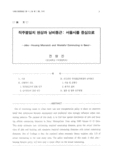

PARTNER
검증된 파트너 제휴사 자료
직주불일치 현상과 낭비통근
방대한 850만건의 자료 중 주제별로 만들수 있는 최적의 산출물을 해피 캠퍼스에서 체험 하세요 전문가의 지식과 인사이트를 활용하여 쉽고 폭넓게 이해하고 적용할수 있는 기회를 놓치지 마세요
13 페이지
최초등록일 2015.03.25
최종저작일
1995.01

-
 * 본 문서는 배포용으로 복사 및 편집이 불가합니다.
* 본 문서는 배포용으로 복사 및 편집이 불가합니다.
미리보기
서지정보
· 발행기관 : 대한교통학회
· 수록지 정보 : 대한교통학회지 / 13권 / 3호
· 저자명 : 전명진
목차
ABSTRACT
Ⅰ. 서론
Ⅱ. 선행연구 검토
Ⅲ. 수도권의 직주불일치 현상과 낭비통근
Ⅵ. 결론 및 향후 연구방향
참고문헌영어초록
One of interesting issues in urban land-use and transportation policy is about an unproven belief that imbalances between employment and residential sites strongly influence urban commuting patterns. The purpose of this study is to find how spatial distribution of jobs and housing affects commuting distances in Seoul Metropolitan Area using 1990 Census O-D Data. This study estimates cost-minimizing required commuting distance, given the actual distributions of jobs and housing, and compares required commuting distances with actual commuting distances. One of findings is that the standard urban economic theory explains only 1/3 of actual commuting in the case study area. The policy implication of this study is that jobs-housing balance policy will have only a minor effect on the actual commuting.참고자료
· 없음태그
-
자료후기
-
자주묻는질문의 답변을 확인해 주세요

꼭 알아주세요
-
본 학술논문은 (주)학지사와 각 학회간에 저작권계약이 체결된 것으로 AgentSoft가 제공 하고 있습니다.
본 저작물을 불법적으로 이용시는 법적인 제재가 가해질 수 있습니다. -
해피캠퍼스는 구매자와 판매자 모두가 만족하는 서비스가 되도록 노력하고 있으며, 아래의 4가지 자료환불 조건을 꼭 확인해주시기 바랍니다.
파일오류 중복자료 저작권 없음 설명과 실제 내용 불일치 파일의 다운로드가 제대로 되지 않거나 파일형식에 맞는 프로그램으로 정상 작동하지 않는 경우 다른 자료와 70% 이상 내용이 일치하는 경우 (중복임을 확인할 수 있는 근거 필요함) 인터넷의 다른 사이트, 연구기관, 학교, 서적 등의 자료를 도용한 경우 자료의 설명과 실제 자료의 내용이 일치하지 않는 경우
“대한교통학회지”의 다른 논문도 확인해 보세요!
-
1945년 해방 이후 정권별 교통정책 변화 (6): 노태우 정부의 국토·경제개발계획과 교통정책: 1988년2월-1993년 8월 9 페이지
1980년대 후반기에는 제5공화국에 대한 국민 들의 불신과 저항에서 발생한 1987년 6월 항쟁, 이를 수용한 6.29 민주화 선언, 9차 개정헌법을 통한 5년 단임의 대통령 직선제 전환요구 등 사회 적 격동기를 겪으며 개정 헌법에 따라 직선제 선거 가 치러졌으며 집권당의 노태우 후보가 1988년 2 월에 6공화국 첫 대통령으로 취임하였다. 노.. -
도로 건설공사 기준 5 페이지
도로 건설공사를 위한 기준은 편의상 상위 기술 기준과 하위 기술기준으로 구분할 수 있다. 상위 기술기준은 법률에 따른 것으로 규칙과 기준으로 구분할 수 있으며 도로법에 의한 ‘도로의 구조·시 설기준에 관한 규칙’ 등과 건설기술진흥법에 따른 ‘도로설계기준’ 등을 들 수 있다. 하위 기술기준은 지침, 편람, 표준도, 요령 등을 말한다. 참고로, 기 .. -
국내외 철도 위험물 격리기준 조사 및 시사점 도출 10 페이지
중국 텐진항 컨테이너 폭발사고(’15.8.12) 이 후 국내 철도 위험물 수송에 대한 안전기준 확립에 대한 필요성이 증대되었고, 국토교통부(’15.10) 는 철도로 운송되는 위험물 관리체계 확립을 위해 기존에 지정되지 않은 유류(경유, 등유, 벙커C유) 와 위험물을 적재한 컨테이너를 추가지정 하였다. 코레일은 현재 운전취급규정에 의거하여 위험물 .. -
졸음운전 감소를 위한 휴식 공간 활성화 방안 10 페이지
우리나라에서 졸음운전으로 인한 교통사고는 2005년부터 집계되었는데, 졸음운전으로 인한 사 망자 수는 감소하는 추세이나 졸음운전으로 인한 사고율은 큰 변동 없이 유지되고 있다. 졸음운전은 사고 발생 시 다른 사고에 비해 위험도가 커서, 도 로교통공단 교통사고 종합분석 센터에 따르면 전 체 교통사고에 비해 거의 2배 이상의 치사율을 보 이고 있다.. -
공항소음분석센터 역할 및 추진방향 5 페이지
시간적, 공간적 제약을 극복하기 위한 교통수단 의 발달은 인간 삶의 질 향상에 크게 기여해 오고 있다. 그러나 이러한 교통수단이 가지는 신속성, 정시성, 경제성 등의 이면에는 필연적으로 주변 사 람들에게 자연환경 피해와 같은 직·간접적인 영향 을 주고 있다. 항공부문의 경우에 있어서는, 공항 소음 및 이산화탄소 배출이 대표적이면서 가장 문 제가..
문서 초안을 생성해주는 EasyAI

